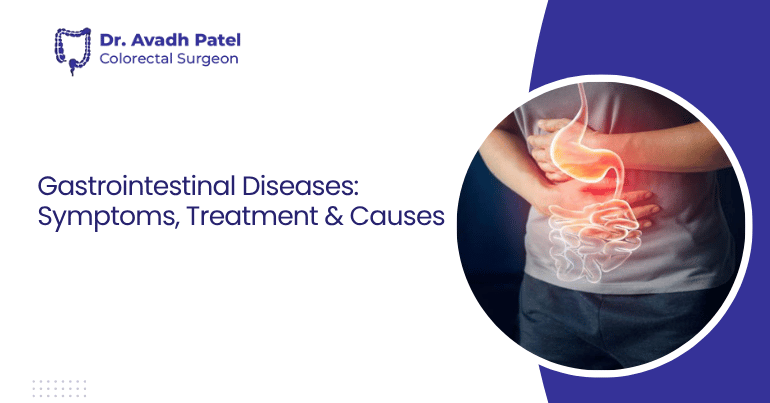The value of the system, of keeping us healthy, is usually underrated until problems manifest in life. Gastrointestinal disease affects portions of the GI tract, e.g., the stomach, intestines, liver, pancreas and others. These problems can range in severity. If neglected, they can immensely influence the way an individual leads their life.
Lots of individuals suffer from stomach problems without recognising that they could indicate the early signs of gastrointestinal disease. Identifying these signs and promptly seeking attention can assist in handling or even averting any potential complications.
Understanding the Causes and Symptoms of Gastrointestinal Problems
Common Symptoms of Gastrointestinal Disease
- Abdominal cramping or pain
- Bloating and gas
- Diarrhoea or constipation
- Heartburn or acid reflux
- Blood in stool
- Unexplained weight loss
Persistent stomach problems should not be overlooked despite discomfort as they may signal severe GI issues, like inflammatory bowel disease (IBD), irritable bowel syndrome (IBS), ulcers or potentially colorectal cancer.
Learning to recognise the early indicators of gut disease can be the key to success in outcomes.
Causes of Stomach and GI Issues
- Poor Diet: High-fat, low-fibre diets can disrupt digestion.
- Infections: Bacterial infections and/or viruses may lead to inflammation.
- Stress: Chronic stress damages the gut and the digestive system.
- Genetics: A patient’s family history may predispose them to gastrointestinal disease.
- Lifestyle Habits: Smoking, alcohol, and physical inactivity lead to gastrointestinal disease.
Treatment Choices
The approach to treatment varies based on the underlying cause and could involve:
- Alterations to someone’s diet
- Supplements containing probiotics or fibre
- The administration of drugs to treat inflammation or acidity levels
- Performing procedures, for both diagnosing and carrying out treatments
- Surgery may be required in cases of long-standing problems
The identification of gastrointestinal issues can assist in achieving favourable treatment outcomes and expediting the process of recovery.
Also Read: 5 Signs You Must Consult a Gastro Surgeon
When to See a Specialist?
If you are experiencing problems with your stomach. Believe you may have the early signs of gastrointestinal disease, seek the advice of, a specialist in gastrointestinal disorders or a colorectal surgeon. It’s crucial not to ignore lingering symptoms, especially if you observe blood in your stool or if you are suffering from unexplained weight loss.
Caring for your health from the beginning can prevent gastrointestinal issues and promote your health and well-being in the best possible way. If you face GI issues or symptoms that keep returning, don’t hesitate to contact a qualified medical professional to identify the root cause and get the right treatment as soon as possible.
Conclusion
For expert attention tailored to your needs, in Ahmedabad, look no further than Dr. Avadh Patel. A Colorectal Surgeon renowned for his expertise in diagnosing and treating intricate gastrointestinal dise ase.

